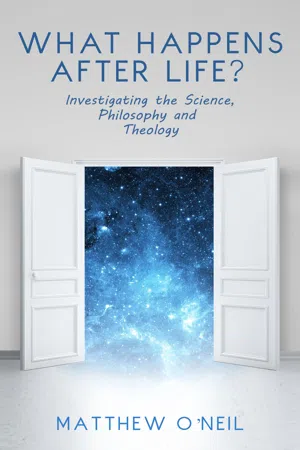![]()
Chapter 1: Heaven
In the Hebrew Bible
Very early on in the Hebrew Bible, we see a mention of heaven. Or, to be more precise, what the authors of the Tanakh accepted as the concept of heaven. In Genesis 1:6-8 it details the creation of the "dome above the earth", in what would be the barrier between earth and the waters that eventually came and caused the flood in Genesis chapter six. In Genesis 7:11, it describes an opening in the firmament, "...and the floodgates of the heavens were opened." Similarly, in Psalm 148:4, "Praise him, you highest heavens, and you waters above the heavens!" It has been noted, however, that this Psalm uses Genesis 1 as the example, thanks to the language used.2 In Genesis chapter one, verse eight, it states, "God called the dome 'Sky' ['Sky' derives from the Hebrew shamayim, or shama, which translates to 'heaven' or, literally, 'the high place']."3 Further along in the chapter, at verse 20, it states, "And God said, 'Let the waters bring forth swarms of living creatures, and let birds fly above the earth across the dome of the sky [shamayim]."4 This passage, and in its context up to verse 23, seems to be a story to rebuke other ancient Israelite, or Semitic, religious traditions, like the Mesopotamian Enuma Elish, as there are references to "the great sea monsters" in verse 21.5
Though these accounts are at the very start of the Bible, it comes from the Priestly source. In context, there are multiple sources to the authorship of Genesis, as well as the other books of the Pentateuch (the five books of Moses; Genesis, Exodus, Leviticus, Numbers, and Deuteronomy). We are able to tell the differences based on language, the name used to refer to God (one author is named "E" for Elohist, as this author referred to God as "Elohim", another is "J" because he referred to God as YHWH [Yahweh] and, as this concept was developed in Germany, YHWH is spelled with a "J" rather than a "Y").6 This theory for the authorship also helps us explain why there are two creation stories (Genesis 1 and Genesis 3) and two flood stories (Genesis 6-9), why Abraham told others his wife is his sister (Genesis 12, 20, and 26), and why there are two accounts for Abraham sending Hagar and Ishmael into the desert (Genesis 16 and 21). The priestly account is the latest addition to the Pentateuch, the first five books of the Tanakh, dating to the end of the exile in Babylon in the sixth century BCE.7
What becomes strikingly obvious, while reading through the Hebrew Bible, is that heaven, or the heavens, were a realm where only God existed. In Psalm 14:2 it reads, "The LORD looks down from heaven on humankind..." Psalm 8:3-4 even questions why God would consider the human race to be worthy of his care, let alone why they would be dominant over all creation: "When I look at your heavens...what are human beings that you are mindful of them, mortals that you care for them?"8 These passages seem to indicate that, not only is heaven a realm that only God occupies, but it is any wonder that God would show any concern with humanity.9 In fact, the only explicit mention of any human being brought into heaven was Elijah, at 2 Kings 2:11.10 This was to emphasize Elijah's importance to the Jewish faith – that he could be inducted into the heavenly sphere where no other soul was permitted. Even the phrase, in verse twelve, "[t]he chariots of Israel and its horsemen" implies power that equated a full cavalry.11 A further example of the authors of the Hebrew Scriptures emphasizing this is found in Malachi 4:5-6.
If we are to take the writings of Josephus into account, Josephus being a late first-century Jewish-Roman historian, later sects of Judaism, specifically the Sadducees, believed in realized eschatology. That meant, in essence, the end of the age was not coming but had already happened or was in progress. More than that, they believed that the soul dissipated at death. For YHWH, the Israelite God, was the God of the living, according to the Sadducees. And, more interestingly, scripture had no assurance of the continuation of the soul after death.12 Why would YHWH be concerned with the souls of the deceased?
Despite the fact that Jews clearly felt that heaven was only reserved for God, there are still clear ideas of what heaven looked like. In the book of Ezekiel, chapters 40-48, it relates the idea of heaven by describing it as a new Jerusalem. This is keeping in mind that Ezekiel wrote during the exile in Babylon during the sixth century BCE – a time when most of the prophetic literature of the Hebrew Bible, the Nevi'im, was written. As the Temple of Jerusalem housed the Ark of the Covenant, which was believed to contain the Ten Commandments and in some instances the staff of Aaron, Moses' brother, and some manna, it was believed to represent the presence of God. As such, the heavens, God's dwelling place, was depicted in Hebrew scripture to resemble not only Jerusalem, but a New Jerusalem. This is also combined with images of Eden, in Ezekiel's narrative, to create what Judaism would view as the most pristine residence for their God, YHWH. Although it emulated the image of the Jerusalem Temple, it is strange that, in heaven, the concept of sacrifice – the main practice of the temple on earth – is gone. The only accounts of sacrifice in the "new Jerusalem" are ...
